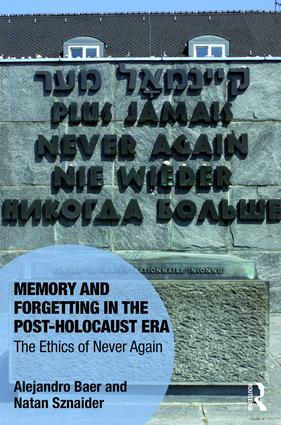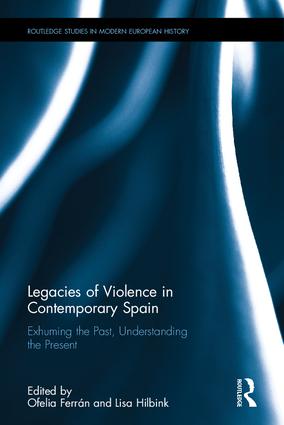Congratulations to Alejandro Baer, Natan Sznaider, Bruno Chaouat, Lisa Hilbink and Ofelia Ferrán for publishing new books! Below are short descriptions of each.
Memory and Forgetting in the Post-Holocaust Era: The Ethics of Never Again. By Alejandro Baer and Natan Sznaider
 To forget after Auschwitz is considered barbaric. Baer and Sznaider question this assumption not only in regard to the Holocaust but to other political crimes as well. The duties of memory surrounding the Holocaust have spread around the globe and interacted with other narratives of victimization that demand equal treatment. Are there crimes that must be forgotten and others that should be remembered? In this book the authors examine the effects of a globalized Holocaust culture on the ways in which individuals and groups understand the moral and political significance of their respective histories of extreme political violence. Do such transnational memories facilitate or hamper the task of coming to terms with and overcoming divisive pasts?
To forget after Auschwitz is considered barbaric. Baer and Sznaider question this assumption not only in regard to the Holocaust but to other political crimes as well. The duties of memory surrounding the Holocaust have spread around the globe and interacted with other narratives of victimization that demand equal treatment. Are there crimes that must be forgotten and others that should be remembered? In this book the authors examine the effects of a globalized Holocaust culture on the ways in which individuals and groups understand the moral and political significance of their respective histories of extreme political violence. Do such transnational memories facilitate or hamper the task of coming to terms with and overcoming divisive pasts?
Is Theory Good for the Jews? By Bruno Chaouat
 For at least fifteen years, any keen observer of European society has been aware that antisemitism is no longer a matter of racial theory, nationalism, or exclusion of the “other.” While in the past antisemites saw Jews as all too modern “rootless cosmopolitans” (to use Stalin’s expression), today’s European antisemitism construes them as obsolete precisely because they are attached to their roots, their land, their community, their origin. The Jews are now perceived as a reactionary force that hinders the progress of humankind toward multiculturalism, understood as the peaceful, infinitely enriching coexistence of ethnicities, races, religions, and cultures within the same territory. The antisemite of yore viewed the Jews as an inferior race; today he views them as racist. Is Theory Good for the Jews? explores how “French thought” is implicated in intellectual, literary and ideological components of the global and local upsurge of antisemitism.
For at least fifteen years, any keen observer of European society has been aware that antisemitism is no longer a matter of racial theory, nationalism, or exclusion of the “other.” While in the past antisemites saw Jews as all too modern “rootless cosmopolitans” (to use Stalin’s expression), today’s European antisemitism construes them as obsolete precisely because they are attached to their roots, their land, their community, their origin. The Jews are now perceived as a reactionary force that hinders the progress of humankind toward multiculturalism, understood as the peaceful, infinitely enriching coexistence of ethnicities, races, religions, and cultures within the same territory. The antisemite of yore viewed the Jews as an inferior race; today he views them as racist. Is Theory Good for the Jews? explores how “French thought” is implicated in intellectual, literary and ideological components of the global and local upsurge of antisemitism.
Legacies of Violence in Contemporary Spain: Exhuming the Past, Understanding the Present. Edited by Lisa Hilbink and Ofelia Ferrán
 This book provides a comprehensive, interdisciplinary study of the multiple legacies of Francoist violence in contemporary Spain, with a special focus on the exhumations of mass graves from the Civil War and post-war era. The various contributions frame their study within a broader reflection on the nature, function and legacies of state-sanctioned violence in its many forms. Offering perspectives from fields as varied as history, political science, literary and cultural studies, forensic and cultural anthropology, international human rights law, sociology, and art, this volume explores the multifaceted nature of a society’s reckoning with past violence. It speaks not only to those interested in contemporary Spain and Western Europe, but also to those studying issues of transitional and post-transitional justice in other national and regional contexts.
This book provides a comprehensive, interdisciplinary study of the multiple legacies of Francoist violence in contemporary Spain, with a special focus on the exhumations of mass graves from the Civil War and post-war era. The various contributions frame their study within a broader reflection on the nature, function and legacies of state-sanctioned violence in its many forms. Offering perspectives from fields as varied as history, political science, literary and cultural studies, forensic and cultural anthropology, international human rights law, sociology, and art, this volume explores the multifaceted nature of a society’s reckoning with past violence. It speaks not only to those interested in contemporary Spain and Western Europe, but also to those studying issues of transitional and post-transitional justice in other national and regional contexts.
Watch Lisa Hilbink, along with other faculty, discuss the politics of mass grave exhumations and human rights here.

Comments